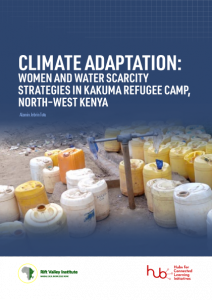This paper investigates the coping and adaptation strategies used by women in Kakuma refugee camp in response to water scarcity, a pressing issue worsened by climate change. Qualitative data collection methods, including focus group discussions, interviews and observations, were employed in order to understand the lived experiences of women in the camp. Results showed that women bear the burden of securing water for domestic use, often walking long distances or waiting in lengthy queues to access this scarce resource in Kakuma. To overcome such challenges, these women have developed a number of strategies, including collaboration in water collection, barter systems to exchange water for food, and innovative water conservation techniques within their households. These mechanisms are deeply influenced by cultural norms, social institutions and the need for survival in resource-scarce conditions. Overall, the paper underscores the importance of recognizing the resilience of women in refugee settings, while calling for more sustainable water management solutions to alleviate the gendered impacts of water scarcity in Kakuma refugee camp.
This paper has been published as a result of Alamin’s training in the Rift Valley Institute’s (RVI)
Research Communities of Practice (RCoP) project. It therefore reflects the views of the author
and not those of the RVI or its position. RCoP is one of several RVI flagship projects that supports
the professional development of early career researchers in eastern and central Africa, through
training, mentorship and the dissemination of research outputs. Based on RVI’s long-term
experience and presence in the region, RCoP is a value–driven project built around a community
of practitioners and academics with a common interest in the professional development of early
career researchers. With funding from OSUN and in partnership with it, in the third phase of its
project, the RVI trained seven early career reseaerchers from Kakuma refugee camp between May
and October 2024.




